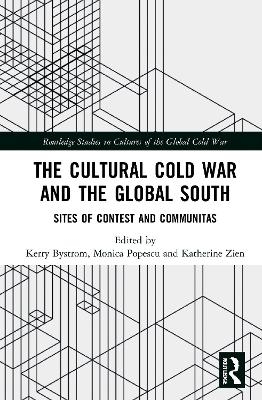
The Cultural Cold War and the Global South
Routledge (Verlag)
978-0-367-67938-5 (ISBN)
This volume investigates the cultural sites where the global Cold War played out. It brings to view unpredictable encounters that arose as writers, artists, filmmakers, and intellectuals from or aligned with the Third World navigated the ideological and material constraints set by superpowers and emerging regional powers. Often these encounters generated communitas and solidarity, while at times they fed old and new conflicts. Pushing forward recent scholarship that tracks the Cold War in the Global South and draws on postcolonial approaches, our contributors use archival, secondary, and ethnographic sources to trace the afterlives and memories of key figures and to explore meetings that performed cultural diplomacy.
Our focus on sites of encounter or exchange underscores the situated, interpersonal, and embodied dimensions through which much of the cultural Cold War was experienced. While the global conflict divided citizens along ideological fault lines, it also linked people through circulating media—novels, film, posters, journals, and theatre—and multinational conferences that brought artists, intellectuals, and political activists together. Such contacts introduced new axes of solidarity and hierarchies of exclusion. Examining these connections and disjunctures, this new and necessary mapping of the cultural Cold War highlights under-addressed locations in Asia, Africa, and Latin America.
Kerry Bystrom is an Associate Professor of English and Human Rights and Associate Dean of the College at Bard College Berlin, A Liberal Arts University. Previous publications include Democracy at Home in South Africa: Family Fictions and Transitional Culture (2016). Monica Popescu is an Associate Professor of English and William Dawson Scholar of African Literatures at McGill University. She is the author of South African Literature Beyond the Cold War (which won the 2012 Gustave O. Arlt Award in the Humanities) and At Penpoint: African Literatures, Postcolonial Studies and the Cold War (2020). Katherine Zien is an Associate Professor in the Department of English at McGill University. Zien’s 2017 book is Sovereign Acts: Performing Race, Space, and Belonging in Panama and the Canal Zone. Her current project, supported by Canada’s Social Sciences and Humanities Research Council, explores militarization and performance in Latin America’s Cold War.
Introduction: "The Cultural Cold War and the Global South: Sites of Contest and Communitas." Part 1: Literary and Cultural Conferences and Meetings 1. "Cultural Bandung or Writerly Cold War? Revisiting the 1956 Asian Writers’ Conference from an India-China Perspective." 2. "Mário Pinto de Andrade, the Cultural Congress of Havana, and the Role of Culture in the Global South." 3. "The Limits of Global Solidarity: Reading the 1968 Cultural Congress of Havana through Andrew Salkey’s Havana Journal." 4. "Sovereign Alliances: Reading the Romance between Cuba and the Anglophone Caribbean in the 1970s." 5. "‘We Understand Each Other’: Writers from Eastern Europe and the Global South at the International Writing Program (1970s)." Part 2: Networks and Festivals of Visual Art and Cinema 6. Ra "Cinema in the Spirit of Bandung: The Afro-Asian Film Festival Circuit, 1957–1964." 7. "From Dakar to Diaspora: The Festival Mondial des Arts Nègres as Nexus and Network." 8. "В Сенегале (In Senegal) and Ритмы Африки (African Rhythms): Soviet Documentaries on Senegal during the Cold War." 9. "Ousmane Sembène’s Borom Sarret and the Circulation of ‘Tractor Art’: A Cold War Contestation of Soviet Machine Iconography." 10. "Networks of South-South Solidarity and Cold War Argentine Filmmaking." Part 3: Literature and Print Culture Itineraries 11. "War, Famine, and Newsprint: The Making of Soviet India, 1942–1945." 12. "The Vatic Bargain: Solidarity and the Futures of the Philippine Cold War." 13. "Asia’s Refugee City: Hong Kong in the Cold War." 14. "Freedom and Development in the Cultural Cold War." 15. "Raindrop on Dusty Ground: Nuruddin Farah, Somalia, and the Cold War." Part 4: Spectacular Performances 16. "Choreographing Ideology: On the Ballet Adaptation of Peter Abrahams’ The Path of Thunder in the Soviet Union." 17. "‘It’s like inviting Pinochet to the Fourth of July’: The Chilean Ship Esmeralda and Intersecting Spectacles in the Global Cold War." 18. "Reenacting Bodily Archives of the Cold War in Lola Arias’s Minefield." 19. Afterword
| Erscheinungsdatum | 06.08.2021 |
|---|---|
| Reihe/Serie | Routledge Studies in Cultures of the Global Cold War |
| Zusatzinfo | 1 Tables, black and white; 28 Halftones, black and white; 28 Illustrations, black and white |
| Verlagsort | London |
| Sprache | englisch |
| Maße | 152 x 229 mm |
| Gewicht | 1140 g |
| Themenwelt | Geschichte ► Allgemeine Geschichte ► Neuzeit (bis 1918) |
| Geschichte ► Allgemeine Geschichte ► Zeitgeschichte | |
| Geschichte ► Teilgebiete der Geschichte ► Kulturgeschichte | |
| Sozialwissenschaften ► Soziologie ► Spezielle Soziologien | |
| ISBN-10 | 0-367-67938-8 / 0367679388 |
| ISBN-13 | 978-0-367-67938-5 / 9780367679385 |
| Zustand | Neuware |
| Informationen gemäß Produktsicherheitsverordnung (GPSR) | |
| Haben Sie eine Frage zum Produkt? |
aus dem Bereich


